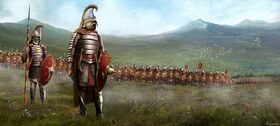Coastal Crusade
| Coastal Crusade | |||||||||
|---|---|---|---|---|---|---|---|---|---|
| Part of the Hesperidesian Crusades | |||||||||
 Imperial Army marches into Ravetta province | |||||||||
| |||||||||
| Belligerents | |||||||||
|
|
| ||||||||
The Coastal Crusade was a military campaign in western Heseperidesia that eliminated the Latin Kingdoms of Hesperidesia and secured the Empire of Exponent's position as hegemon on the continent.
Background
While the Hesperidesian Crusades were initially meant by Maximinus I as a holy mission to defend Christianity against the savage natives and protect the Exponential borders, the vision of a unified land started taking shape as their successes mounted: a unified Hesperidesia.
Upon defeating Sarantea, Charvonia, and their native allies during the Northern Crusade, the next target could only be the Latin Kingdoms of Hesperidesia – whose resistance to the Imperial Rule dated back to the Schism of Paradisia in the third century AD, being only tolerated thanks to the common faith they shared in Christ.
The war officially began in 1164, after Pope Simeon II excommunicated the King of Basilea, Amianthus IV for his unchristian marriage to a tribal woman and his refusal of repudiating her.
As a consequence of the excommunication, the Latin Kingdoms of Basilea, Ravetta and Albandaea – that thrived by co-existing with the native tribes – made common cause and leveraged a hefty tax on the “worldly possessions of the Church”, as written in the edict cosigned by the three Kingdoms.
For this heinous act against the Church, thus against God, the Pope called for a Crusade and the Empire of Exponent promptly answered.
Campaign
The Coastal Crusade was supposed to be easy and quick, as the Exponential Army was well prepared and trained in jungle warfare and the Latin Kingdoms were relatively small in scale, but it wound up being one of the bloodiest conflicts in the history of the Empire: equipped with modern weapons and trained in the tradition of Roman warfare, the small Latin armies mounted a fierce resistance employing ante-litteram guerrilla tactics and using their native foederati as fodder, while their tight formations of extremely well-armored knights invariably devastated the Imperial infantry.
On the sea, the navy of the Latin Kingdoms outclassed its larger Exponential counterpart by employing smaller, more maneuverable vessels, in comparison with the older and bulkier galleys the Empire mainly used: the only major naval battle was fought in 1166 and ended in the decimation of the Imperial Navy, forcing it to maintain defensive positions and relinquish any thought of a naval offensive.
Realizing that the conflict was coming to a standstill, general Remus Claefton decided to pave open the way to the army by resorting to the most terrible method: burning down the jungle and its inhabitants.
Using Greek Oil and a vast array of trebuchets, the jungle was slowly rendered barren and inhospitable while the very homeland of the tribal foederati of the Latin Kingdoms was burned to the ground.
The historian George Tibelli recounts that when the Latin Kingdoms pledged for a peaceful resolution in 1168, the Pope himself forbade Emperor Octavius II from accepting to restore the status quo.
In 1170 the Kingdom of Ravetta yielded to the might of the Empire, followed by the Kingdom of Basilea in 1171 and, lastly, the Kingdom of Albandaea in 1172.
Aftermath
The Coastal Crusade ended with the annexation of the Latin Kingdoms of Hesperidesia to the Empire of Exponent and the eradication of the native kingdoms of Bawalu, Peridia and Antalbia.
The brutal handling of the later part of the war was so ill-received by the population of the Empire that the Emperor himself condemned the brutal means employed by general Clafton and decommissioned him after the end of the Crusade, pledging to let the jungle regrow and extend mercy upon the inhabitants of the Latin Kingdoms, allowing them easier access to Imperial citizenship.
The portion of jungle burned down during the Crusade is still intact to date, hosting the Latin Natural Reservoir.
Legacy
Alcantara
Albandaean merchants and seafarers had established ports and trading posts in the area of modern-day Alcantara during the eleventh centry. With the collapse of the Kingdom of Albandaea in 1172, many leading Albandaean families became refugeees, fleeing to ports in the area with their possessions and establishing new kingdoms.
Isenna
The Kingdom of Basilea had previously held governance over the area known as Isenna, ruling through the Principatus system, which gave the Isennans significant autonomy in their affairs. Following their defeat, many Basilean nobles fled to Isenna, causing a large influx of money and manpower into the area. Among these nobles, there were the (later called) Ludvicians.